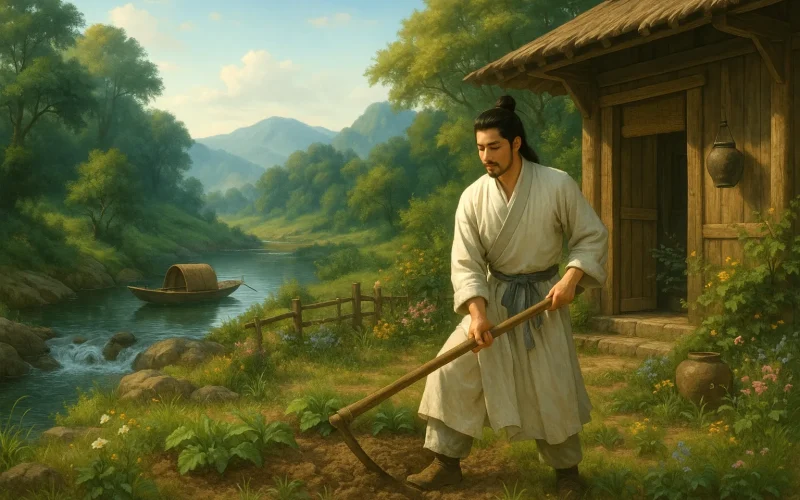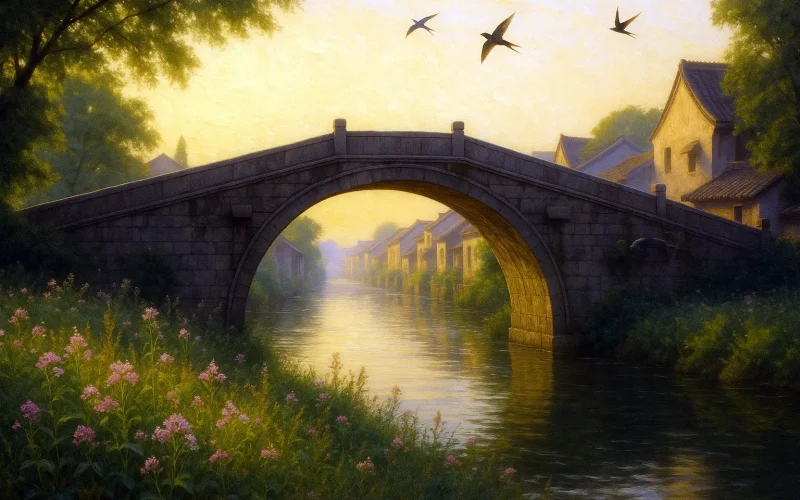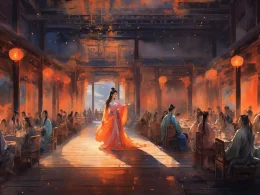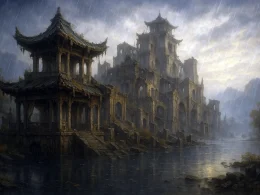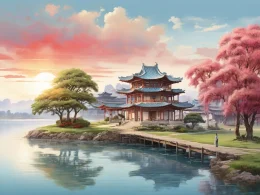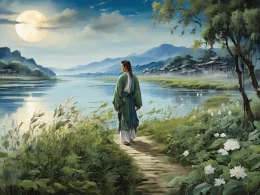An old fisherman spent the night here, under the western cliff;
He dipped up water from the pure Hsiang and made a bamboo fire;
And then, at sunrise, he went his way through the cloven mist,
With only the creak of his paddle left, in the greenness of mountain and river.
...I turn and see the waves moving as from heaven,
And clouds above the cliffs coming idly, one by one.
Original Poem
「渔翁」
柳宗元
渔翁夜傍西岩宿, 晓汲清湘燃楚烛。
烟销日出不见人, 欸乃一声山水绿。
回看天际下中流, 岩上无心云相逐。
Interpretation
This poem was written by Liu Zongyuan during his exile in Yongzhou (approximately 805–815 AD). At that time, far removed from the political center, he was stranded in a remote landscape, struggling with loneliness, yet gradually discovering the quiet beauty of nature. It was against this backdrop that this poem was born. Liu Zongyuan uses the leisurely life of an old fisherman as his subject, expressing his yearning for a reclusive existence while also revealing a trace of self-consolation after disappointment and a sense of solitary pride.
First Couplet: “渔翁夜傍西岩宿,晓汲清湘燃楚烛。”
Yú wēng yè bàng xī yán sù, xiǎo jí qīng xiāng rán chǔ zhú.
The old fisherman moors his boat by western cliffs at night; at dawn, he draws clear Xiang water and lights bamboo for fire.
The opening lines are picturesque—a quiet night’s stay, followed by movement at daybreak. In just two lines, the poet sketches the simple and tranquil life of the fisherman. The details of drawing water and lighting a fire not only evoke the rhythms of daily life but also highlight the beauty of the regional scenery with the mention of "Chu bamboo," making the morning scene all the more poetic, as if veiled in faint bamboo smoke.
Second Couplet: “烟销日出不见人,欸乃一声山水绿。”
Yān xiāo rì chū bú jiàn rén, ǎi nǎi yī shēng shān shuǐ lǜ.
Mist dissolves, sun rises—no one is seen; then, with a creak of oars, mountains and water turn emerald.
This couplet creates a wondrous atmosphere. The unexpected "absence" of the fisherman adds mystery to the scene. The sudden sound of oars reveals his presence, animating the once-still landscape. The phrase "mountains and water turn emerald" seems awakened by the oar’s sound, crafting a serene, mystical, and spiritual imagery that also reflects the poet’s lofty yet slightly lonely state of mind.
Third Couplet: “回看天际下中流,岩上无心云相逐。”
Huí kàn tiān jì xià zhōng liú, yán shàng wú xīn yún xiāng zhú.
Looking back, his boat is mid-river beneath the sky; atop the cliffs, carefree clouds chase one another.
The perspective suddenly widens, expanding the scene. The fisherman drifts away with the current, leaving only the clouds playfully chasing each other over the mountain peaks. These "carefree clouds" become a projection of the poet’s soul—just as the fisherman drifts freely, so too does Liu Zongyuan yearn for such a state, though it remains beyond his reach.
Holistic Appreciation
The entire poem resembles a tranquil landscape painting, with the fisherman’s movements as fleeting as shadows, while the scenery grows more vivid in his presence. Through subtle, elusive descriptions, Liu Zongyuan hides the "human" within the "landscape," creating a scene rich in charm and mystery. The fisherman in the poem is both a child of nature and an embodiment of the poet’s spirit—wordless, yet conveying a serene and noble way of life.
From visual to auditory, from close-ups to distant views, Liu Zongyuan unfolds the scene layer by layer, crafting an artistic realm where reality and illusion, movement and stillness, intertwine. Though the depiction of the fisherman’s actions is minimal, it leaves a profound impression, hinting at the poet’s deep longing to break free from constraints and return to nature, interwoven with his frustration over an unkind reality.
Artistic Merits
This poem employs a "frozen moment" technique, capturing only a few fragments of the fisherman’s life, yet conveying profound meaning with brevity. The language is minimalist yet infinitely evocative, particularly in lines like "Mist dissolves, sun rises—no one is seen" and "with a creak of oars, mountains and water turn emerald," which break conventional visual and narrative logic, creating poetic tension.
The poem uses highly visual descriptions and clever negative space, making the fisherman as elusive as clouds or shadows, evoking a mysterious, quiet, and distant atmosphere. At the same time, it incorporates multiple sensory elements—sound, color, and movement—immersing the reader as if they were present. The interplay of reality and illusion, movement and stillness, showcases Liu Zongyuan’s masterful artistic control.
Insights
This poem not only depicts the serene beauty of Yongzhou’s landscape but also serves as a metaphorical work. The fisherman’s freedom, detachment, and indifference to worldly affairs become symbols of the poet’s spiritual aspirations. Despite his political downfall and exile, Liu Zongyuan does not succumb to despair. Instead, he channels his emotions into nature, using the fisherman’s shadow to express his ideals. The poem conveys a strong will to pursue spiritual freedom and transcendence, even within constraints.
This poem teaches us that in adversity, one can still find peace and fulfillment through communion with nature. What the poet portrays is not merely idyllic leisure but a realm of spiritual liberation beyond reality—inspiring future generations to maintain clarity of mind and purity of heart, even in the deepest valleys.
Poem translator
Kiang Kanghu
About the poet
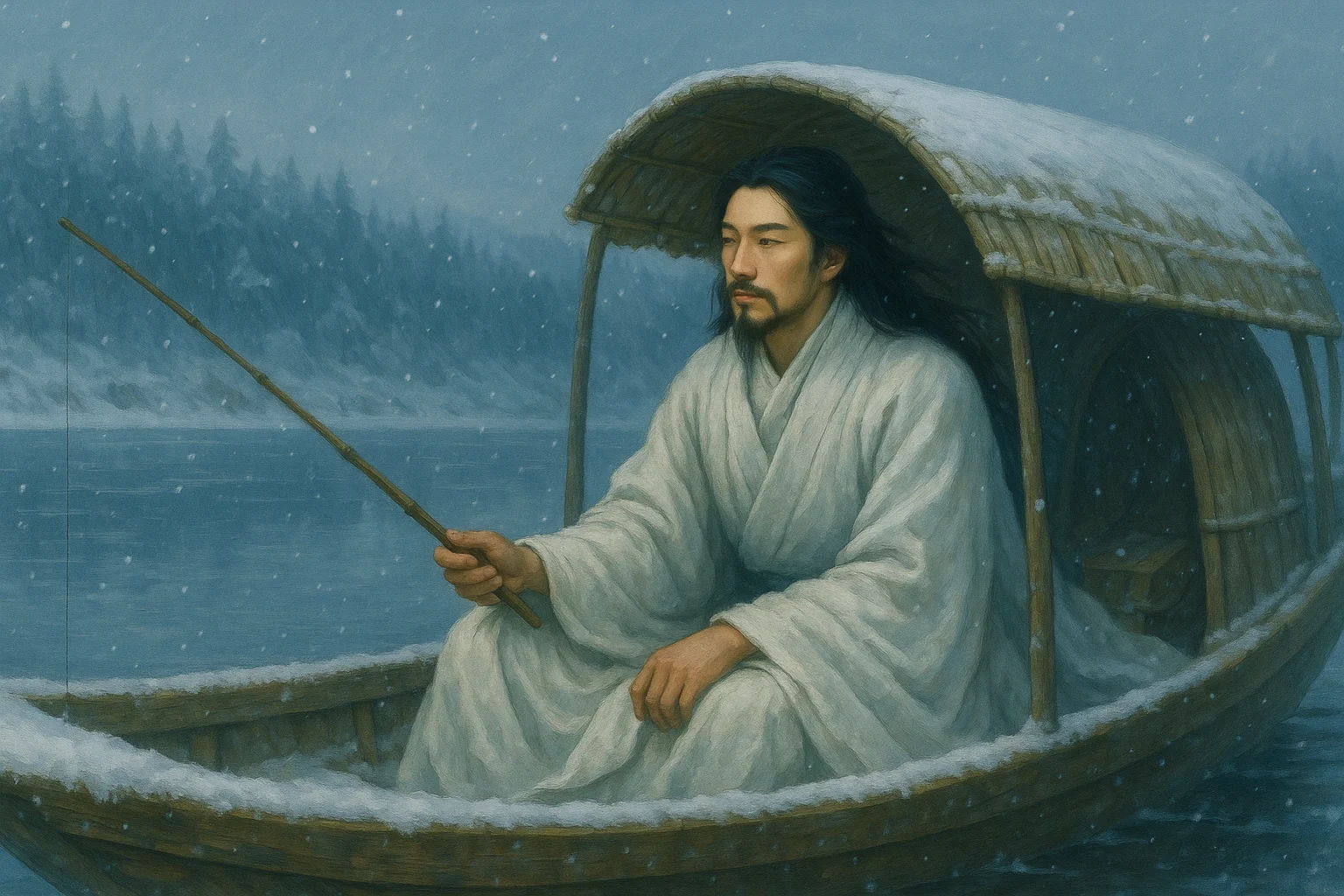
Liu Zongyuan (柳宗元), 773-819 A.D., a native of Yongji, Shanxi, was a progressive thinker, brilliant writer, and revolutionary statesman of the Tang Dynasty. Nineteen years before he was born, the An Shi Rebellion broke out, which dramatically changed the Tang Dynasty from prosperity to decline. The subsequent failure of the Yongzhen Reform was a historical tragedy that cut short Liu Zongyuan's political future, but made him one of the leading thinkers and literary figures of the Tang Dynasty.







